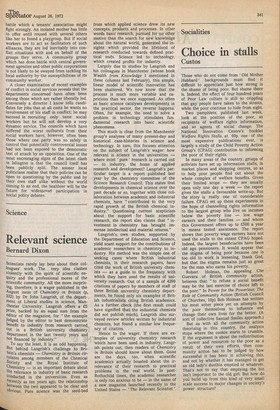Science
Relevant science
Bernard Dixon
Scientists rarely lay bets about their colleagues' work. The very idea clashes violently with the spirit of scientific enquiry and the professional mores of the scientific community. All the more surprising, therefore, is a wager published in the August issue of Chemistry in Britain (p. 332) by Dr John Langrish, of the depart-. rnent of Liberal studies in science, Manchester University. Langrish offers a £5 Prize, backed by an equal sum from the editor of the magazine, for "the example Judged by the editor to best demonstrate benefit to industry from research carried cut in a British university chemistry department in the last twenty years and not financed by industry." To say the least, it is an odd happening. But behind Langrish's challenge to Britain's chemists — Chemistry in Britain circulates among members of the Chemical Society and the Royal Institute of Chemistry — is an important debate about the relevance to industry of basic research Conducted in the universities. Even as recently as ten years ago, the relationship between the two appeared to be clear and Obvious . Pure science was the seed-bed
from which applied science drew its new concepts, products and processes. In other words basic research, pursued for no other motive than the search for new knowledge about the natural world, generated the insights which provided the lifeblood of research conducted towards defined practical ends. Science led to technology, which created profits for industry.
Largely due to studies by Langrish and his colleagues in Manchester (whose book Wealth from Knowledge I mentioned in these columns last February), this simple, linear model of scientific innovation has been shattered. We now know that the process is much more variable and capricious than we once supposed. As often as basic science catalyses developments in the practical sector, the reverse happens. Often, for example, the need to solve a problem in technology stimulates fundamental research into basic scientific phenomena.
This much is clear from the Manchester group's analyses of many present-day and historical case-histories in science and technology. In turn, this focuses attention on the subject of Langrish's wager: how relevant is science in the universities — where most ' pure ' research is carried out — to industry, the home of applied research and development? Langrish's particular target is a report published last year by the chemistry committee of the Science Research Council. This states that developments in chemical science over the past decade or so, together with close collaboration between academic and industrial chemists, have "contributed to the very rapid growth of the British chemical industry." Questioning current scepticism about the support for basic scientific research, the report also claims that "investment in chemistry has brought immense intellectual and material returns."
Langrish's own studies, supported by the Department of Education and Science, yield scant support for the contributions of academic researchers in chemistry to industry. His method was the simple one of seeking cases where British industrial chemists, in their research papers, have cited the work of British university chemists — as a guide to the frequency with which they have used the results of university research. Out of a sample of 4299 citations of papers by members of staff of three British university chemistry departments, he found only six examples of British industrialists citing British academics. As a further check (the first result could have signified that the industrial chemists did not publish much), Langrish also surveyed review articles written by industrial chemists, but found a similar low frequency of citation.
Hence to the wager. If there are examples of university chemistry research which have been used in industry, Langrish points out, then readers of Chemistry in Britain should know about them. Gone are the days, too, when scientific academics actually boasted about the irrelevance of their research to practical problems in the real world. In postRothschild times, the academic researcher is only too anxious to be — in the name of a new magazine launched recently in the United States — 'The Relevant Scientist '.










































 Previous page
Previous page